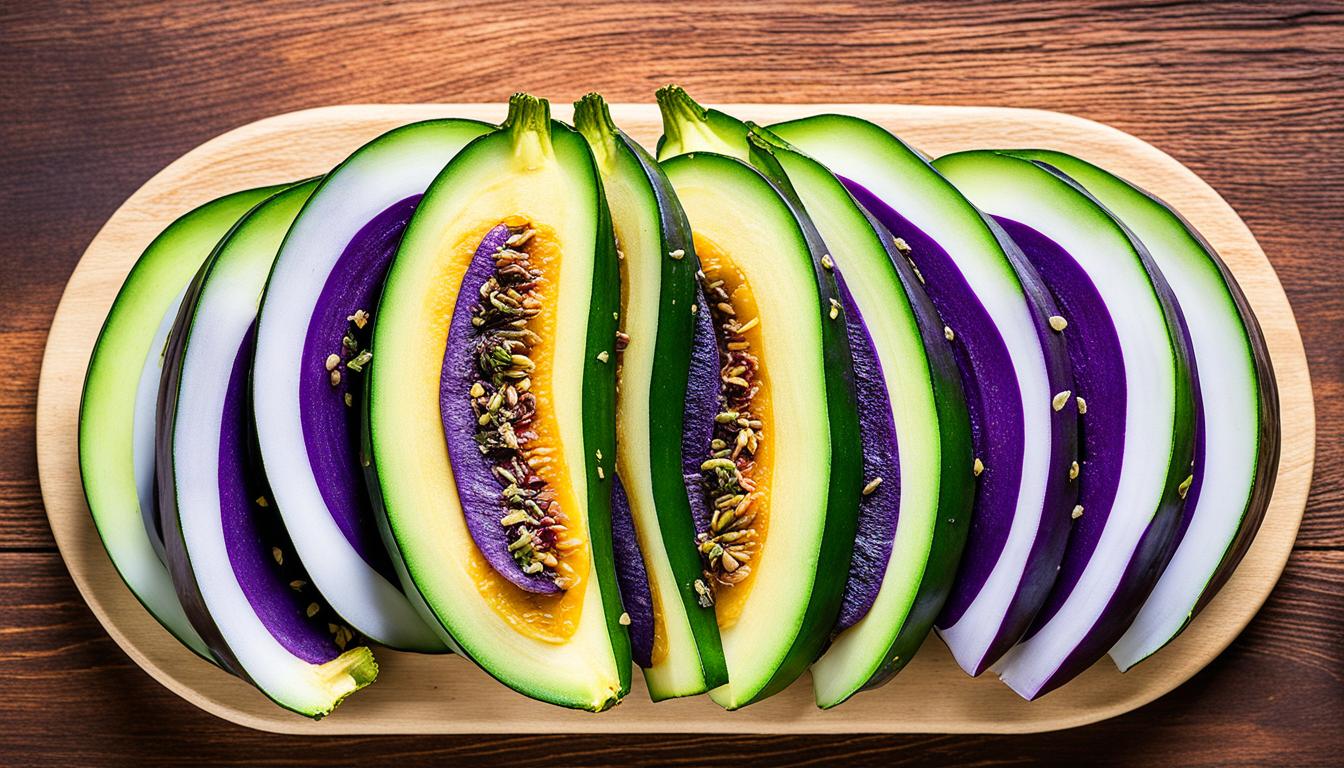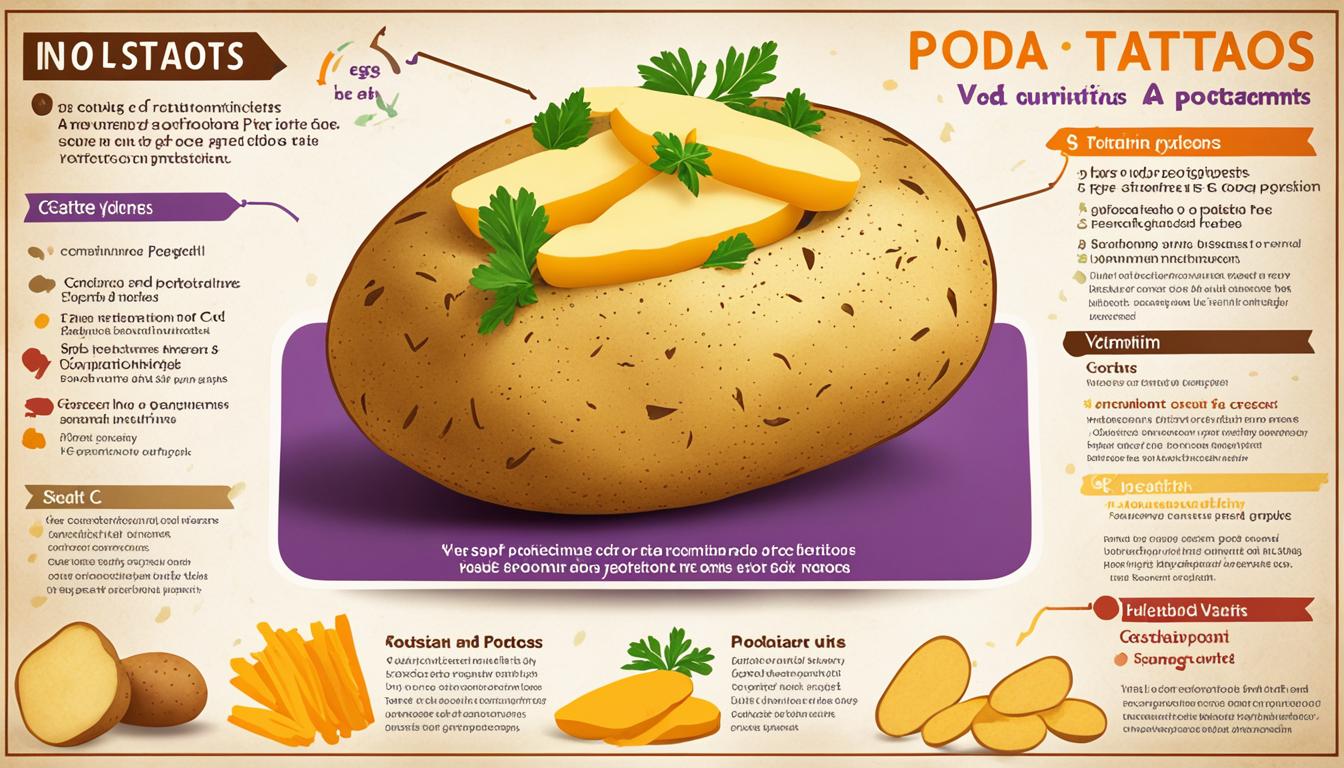Did you know that 1 cup of cooked brinjal has 3 grams of fiber and only 20 calories? This purple fruit is rich in antioxidants, vitamins, and minerals. It boosts heart health, helps in weight management, and supports brain function. Find out how this humble veggie is a nutritional powerhouse.
Key Takeaways
- Brinjal (eggplant/aubergine) is a low-calorie, high-fiber vegetable packed with essential vitamins, minerals, and antioxidants.
- The fiber and phytochemicals in brinjal can help lower cholesterol, reduce the risk of heart disease, and manage blood sugar levels.
- Brinjal’s antioxidant content may protect the brain, enhance cognitive function, and reduce the risk of neurodegenerative diseases.
- Compounds in brinjal, such as lutein and nasunin, can support eye health and prevent age-related macular degeneration.
- Incorporating brinjal into a balanced diet can provide a range of health benefits, from weight management to cancer prevention.
Introduction to Brinjal: The Versatile Vegetable
What is Brinjal?
Brinjal, also known as eggplant, belongs to the Solanaceae family. This family has many famous members like tomatoes, potatoes, and peppers. It is a tropical plant that grows as a perennial in warm regions.
It has spiny stems and white to purple flowers. Its fruit is a familiar egg-shape and has a glossy purple skin. Sometimes, this fruit can be red, green, or even black.
Brinjal is known for its spongy, meaty texture. It tastes mild and slightly bitter after cooking.
Varieties of Brinjal
Brinjal comes in lots of varieties. They can vary in size, shape, and color. The well-known type is the big, deep purple one. But there are also white, green, and striped types.
Some are long and thin, while others are short and round. No matter their look, all brinjal has a spongy texture and a mild, slightly bitter taste.
Brinjal Nutrition Profile
Brinjal is packed with essential vitamins, minerals, and phytochemicals. A cooked 1 cup (82g) serving has:
- Calories: 20
- Carbohydrates: 5g
- Fiber: 3g
- Protein: 1g
This vegetable is low in calories but high in fiber. It can make you feel full and help your tummy stay healthy. You’ll also get some protein and carbs from it.
Micronutrients and Phytochemicals
Brinjal is rich in vitamins, minerals, and healthy plant chemicals. In a 1 cup serving you’ll have:
- Manganese: 10% of the RDI
- Folate: 5% of the RDI
- Potassium: 5% of the RDI
- Vitamin K: 4% of the RDI
- Vitamin C: 3% of the RDI
It also has antioxidants that are very good for you. These include anthocyanins, chlorogenic acid, and nasunin. They give brinjal its lovely purple color and health benefits.
Antioxidant Power of Brinjal
One key feature of brinjal is its high level of antioxidants. It contains a lot of anthocyanins, giving it a deep purple color. These antioxidants fight harmful free radicals. This can lower the risk of diseases like cancer and heart issues. It also has chlorogenic acid and nasunin, which add to its antioxidant power. The mix of these antioxidants makes brinjal excellent at protecting our bodies. It defends against oxidative stress and inflammation.
Brinjal Nutrition Facts for Weight Management
Brinjal is great for those watching their weight. It has only 20 calories in a 1 cup serving, making it a top pick since it’s so low in calories. It’s also packed with 3 grams of fiber per serving. Fiber makes you feel full and satisfied, so you’re less likely to eat too much. With fiber, your body takes in sugar slower, keeping your blood sugar even. This stops the hunger highs and lows that can make you eat more. Including brinjal in a diet can help with weight management.
Low in Calories, High in Fiber
Choosing brinjal is a smart move for weight control. A cup of raw brinjal has just 20 calories but brings 3 grams of fiber to the table. This fiber fills you up and lowers your chances of overeating. Plus, it keeps your blood sugar steady, helping you avoid cravings. By adding brinjal to your meals, you can boost your efforts to shed or maintain weight easily.
| Nutrient | Amount per 1 cup (82g) of raw brinjal |
|---|---|
| Calories | 20 |
| Carbohydrates | 5 grams |
| Fiber | 3 grams |
| Protein | 1 gram |
| Manganese | 10% of the RDI |
| Folate | 5% of the RDI |
| Potassium | 5% of the RDI |
| Vitamin K | 4% of the RDI |
| Vitamin C | 3% of the RDI |
Brinjal and Heart Health
Brinjal is good for our hearts. It has fiber, antioxidants, and other plant compounds. These help lower cholesterol. Studies show fiber can block the absorption of “bad” cholesterol. And, chlorogenic acid helps decrease LDL and boosts the HDL/LDL ratio.
Also, purple brinjal skin has anthocyanins. These reduce inflammation, a factor in heart disease. By eating brinjal, we can help keep our hearts healthy. It’s good for cholesterol and reduces our risk of heart problems.
Effects on Cholesterol Levels
Besides helping with cholesterol, brinjal lowers heart disease risk. It has fiber, potassium, and antioxidants. These lead to fewer heart attacks and strokes.
Fiber makes us feel full, aiding in weight control. This eases stress on our hearts. Potassium keeps our blood pressure healthy. And antioxidants shield our hearts from free radical damage.
Brinjal also improves blood flow and makes arteries less stiff, good for our hearts. By adding brinjal to our diets, we support our heart’s health.
Reduced Risk of Heart Disease
Brinjal’s nutrients are great for fighting heart disease. Its fiber, antioxidants, and plant compounds lower cholesterol. Fiber stops us from absorbing too much “bad” cholesterol. And, chlorogenic acid balances our cholesterol.
Also, anthocyanins in the skin cut inflammation. This is key in preventing heart disease. Eating brinjal helps maintain good cholesterol and lowers heart risk.
Brinjal for Diabetes Management
Brinjal can help people with diabetes or those at risk. It has a lot of fiber, which is key for keeping blood sugar levels stable. Fiber slows down how sugars are absorbed. This stops blood sugar from going too high or too low quickly.
Actually, the fiber in brinjal can make the body react better to insulin. This lowers the chance of having high blood sugar. Also, things like chlorogenic acid in brinjal help by boosting insulin and cutting down how much sugar is absorbed. Using brinjal in a healthy diet can make a real difference for those with diabetes.
Brinjal Nutrition Facts for Brain Function
Brinjal, or eggplant, is great for the brain. It has a powerful antioxidant called nasunin. Nasunin is in the brinjal’s skin and protects brain cells from free radicals. These are harmful substances. Nasunin helps to carry nutrients into brain cells and get rid of waste. This is important for great brain function. Also, brinjal contains anthocyanins and polyphenols. These help memory, learning, and lower the chance of brain diseases like Alzheimer’s. Brinjal improves blood flow to the brain and lowers inflammation. This helps keep the brain healthy as people get older.
Protecting Against Neurodegenerative Diseases
Brinjal’s antioxidants are not just good for the brain. They also safeguard it from diseases like Alzheimer’s and Parkinson’s. They do this by stopping brain fat from breaking down. If the fats break down, brain cells can get damaged. Moreover, the antioxidants in brinjal reduce brain inflammation. This is crucial in the diseases’ progression. Eating brinjal can help keep your brain safe and ready as you age.
Brinjal and Cancer Prevention
New studies show that the stuff in brinjal might help stop cancer. This includes compounds like chlorogenic acid and anthocyanins. They are antioxidants and fight inflammation. They stop harmful free radicals from damaging cells, possibly slowing down cancer growth.
A substance in brinjal, solasodine rhamnosyl glycosides (SRGs), is also interesting. It could help kill tumor cells and lower cancer chances coming back. Although more studies are needed, eating brinjal can be a healthy way to help fight cancer.
Eye Health and Brinjal
Brinjal, also known as eggplant or aubergine, is great for eye health. It can help prevent age-related macular degeneration. This is a common cause of vision loss in older people. The vegetable is rich in lutein, a strong antioxidant that keeps eyes healthy.
Lutein and Age-Related Macular Degeneration
Lutein is key for protecting the macula. This is crucial for clear central vision. It guards against blue light and oxidative stress. Adding brinjal to your meals can help avoid age-related macular degeneration. It’s full of lutein and other good plant substances that are great for your eyes.
Aubergine or eggplant is full of lutein. It protects your eyes from blue light and stress. Adding it to your meals can help keep your vision healthy for years to come. It reduces the risk of age-related macular degeneration too. This is a big cause of vision loss as we get older.
Conclusion
Brinjal is not just any vegetable; it’s a nutritional gem. It’s packed with antioxidants and offers great health benefits. These include improving heart health, managing diabetes, boosting brain function, and supporting eye health. Adding brinjal to your diet enriches it with essential vitamins, minerals, and plant compounds. This greatly helps in staying healthy and fighting off diseases.
Enjoy brinjal in various dishes to make your meals both tasty and nutritious. It’s a smart choice for a healthy lifestyle.
The brinjal benefits summary shows us how valuable this vegetable is. It contains lots of fiber and antioxidants. These can help your heart, control diabetes, boost your brain, and protect your eyes. The eggplant nutrition wrap-up demonstrates brinjal’s adaptability and health benefits, making it a top pick for a healthy diet.
The aubergine key takeaways stress that brinjal is a superstar when it comes to nutrition. It can help in staying well and preventing sickness.
In the end, brinjal is a vegetable you should definitely include in your meals. Doing so will bring you many health advantages. It’s a simple way to support your well-being every day.
FAQ
What are the key nutritional benefits of brinjal?
How does the antioxidant content of brinjal contribute to its health benefits?
Can brinjal support weight management efforts?
How can brinjal contribute to heart health?
What are the potential benefits of brinjal for individuals with diabetes?
How can brinjal support brain health and cognitive function?
Does brinjal have any potential benefits for cancer prevention?
How can brinjal support eye health?
Source Links
- https://www.netmeds.com/health-library/post/brinjal-eggplant-nutrition-health-benefits-uses-side-effects-and-precautions
- https://www.medicalnewstoday.com/articles/279359
- https://www.healthline.com/nutrition/eggplant-benefits
- https://www.euroschoolindia.com/blogs/brinjal-uses-benefits-and-more/
- https://www.webmd.com/food-recipes/eggplant-health-benefits
- https://link.springer.com/chapter/10.1007/978-981-19-9016-8_10
- https://www.verywellfit.com/eggplant-nutrition-facts-calories-and-health-benefits-4118571
- https://www.webmd.com/diet/health-benefits-of-eggplant
- https://www.sightresearchuk.org/nutrition/aubergines-good-for-your-eyes/
- https://www.mdpi.com/2223-7747/11/17/2267



